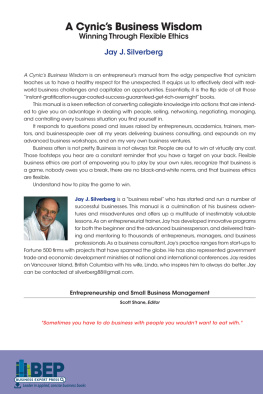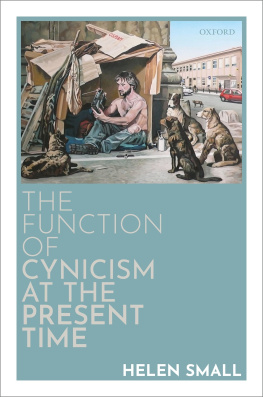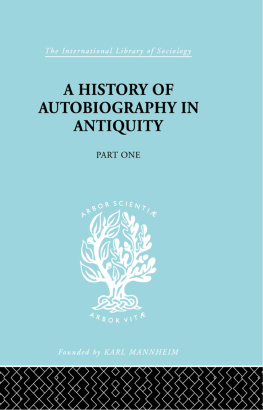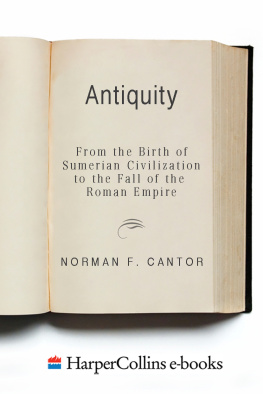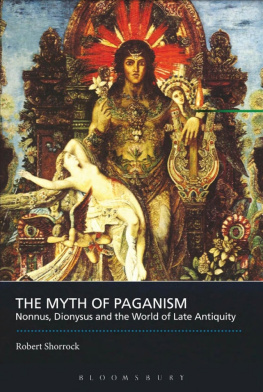Cynics
Ancient Philosophies
This series provides fresh and engaging new introductions to the major schools of philosophy of antiquity. Designed for students of philosophy and classics, the books offer clear and rigorous presentation of core ideas and lay the foundation for a thorough understanding of their subjects. Primary texts are handled in translation and the readers are provided with useful glossaries, chronologies and guides to the primary source material.
Published
Cynics
William Desmond
Neoplatonism
Pauliina Remes
Presocratics
James Warren
Stoicism
John Sellars
Forthcoming
Ancient Commentators of Plato and Aristotle
Miira Tuominen
Ancient Scepticism
Harald Thorsrud
Aristotle
Vasilis Politis
Confucianism
Paul Goldin
Epicureanism
Tim OKeefe
Classical Islamic Philosophy
Deborah Black
Plato
Andrew Mason
Socrates
Mark McPherran
Cynics
William Desmond
First published 2006 by Acumen
Published 2014 by Routledge
2 Park Square, Milton Park, Abingdon, Oxon OX14 4RN
711 Third Avenue, New York, NY 10017, USA
Routledge is an imprint of the Taylor & Francis Group, an informa business
William Desmond, 2008
This book is copyright under the Berne Convention.
No reproduction without permission.
All rights reserved. No part of this book may be reprinted or reproduced or utilised in any form or by any electronic, mechanical, or other means, now known or hereafter invented, including photocopying and recording, or in any information storage or retrieval system, without permission in writing from the publishers.
Notices
Practitioners and researchers must always rely on their own experience and knowledge in evaluating and using any information, methods, compounds, or experiments described herein. In using such information or methods they should be mindful of their own safety and the safety of others, including parties for whom they have a professional responsibility.
To the fullest extent of the law, neither the Publisher nor the authors, contributors, or editors, assume any liability for any injury and/or damage to persons or property as a matter of products liability, negligence or otherwise, or from any use or operation of any methods, products, instructions, or ideas contained in the material herein.
ISBN: 978-1-84465-128-3 (hardcover)
ISBN: 978-1-84465-129-0 (paperback)
British Library Cataloguing-in-Publication Data
A catalogue record for this book is available from the British Library.
Designed and typeset in Minion by Kate Williams, Swansea.
Contents
For support which in sundry ways has contributed to this book, I would like to thank the following: John Cleary, John Dillon, Vasilis Politis, Santiago Sia, Andrew Smith, James Thorne, and all my colleagues at the Department of Ancient Classics at NUI Maynooth. I am also grateful to the anonymous readers for Acumen, whose suggestions have collectively been very helpful.
According to legend, Alexander the Great had heard reports of a particular philosopher who professed a strange sort of wisdom. Owning little more than the clothes he wore, this man lived in the open in cities such as Athens and Corinth. At night he might sleep on the ground, or in porticoes or the entrances of temples, while during the day he wandered about, passing remarks about the people he met and the foolish things he saw them doing. This philosopher was said to have been exiled from his native city of Sinope, far to the north on the Black Sea, but he did not care, he said. His home was the whole earth, and he could live anywhere he liked. He was happier than kings, he said, and freer, more courageous, more just and better in all ways. In fact, everyone should become an exile like him, he said, and give up property, jobs, citizenship: everything. All these simply tie people down and make them unhappy, as they work and save for things that they do not need. If they lived like the birds or animals, they would have everything they want and be like gods. Such things the philosopher used to say to everyone he met, sometimes with a joke or a wry word, sometimes shouting, or rolling on the ground to make his point. In any case, he was quite a show and although his name was Diogenes, he was generally called by his nickname, the Dog. Some people just laughed at this dog-philosopher, others grew indignant, some thought him clever, and a few even followed him around as their teacher. Alexander himself had been taught by the great Aristotle, who had been taught by Plato, and Plato in turn by Socrates. But this Diogenes was said to be a Socrates gone mad, so eccentric was he. Throughout his life Alexander would oft en show interest in the experience and wisdom of other peoples and he may possibly have wondered whether Diogenes had insights worth hearing. In any case, the story is that Alexander took the time to visit Diogenes the Dog. He found him lolling in the sun but when the king generously offered him his choice of gift s, Diogenes replied dismissively, Stand out of my sun.
So goes the story at least and, regardless of its historical accuracy, it does encapsulate many of the ideas of ancient Cynicism: elemental good and wise simplicity trumps the passing vanities of kings. This book will be about these ideas, the Cynics who lived them and the various contexts in which they appear. But first we must backtrack, and begin with the word itself. For although the word cynic derives from ancient Greek, Cynics such as Diogenes were rather different from their modern namesakes. When we think today of a cynic, it is usually of someone who has a low opinion of other human beings. In the cynics perspective, people are greedy, materialistic, manipulative and hypocritical. They act only out of self-interest. If they claim otherwise, and pretend to be acting out of love, honour, patriotism, piety, a sense of right or of duty, or from any such idealistic motive, then they are lying. For the modern cynic, politicians, for example, are not public servants but unscrupulous individuals who crave attention and power and, when they have them, use them to benefit themselves and their allies. Moreover, for the modern cynic there is no public good or universal standard of morality. There is only my good, and therefore I can only act out of self-interest. Such self-interest may involve a certain cunning manipulation of ideals, for if one is clever, one hides ones egoism behind attractive phrases, fooling others with the appearance of respectability. This Machiavellianism is oft en associated with a ruthless sort of cynicism: the end justifies any means. For related reasons, cynicism can be equated with nihilism, that is, the rejection of all ideals and shared meaning; and with pessimism, that is, the view that life ultimately is not good, and has no point. Thus, George Bernard Shaws definition of the pessimist could well apply to the cynic: a man who thinks everybody is as nasty as himself, and hates them for it. Some feel that cynicism is pervasive in contemporary Western societies, bringing with it a malaise and a damaging sense of futility.
Yet many of these negative associations should be put aside in considering ancient Cynicism. The ancient Cynics could be many things, but they were not ruthless Machiavellians or destructive nihilists. They were often pessimistic about human motivation, and they could satirize their own contemporaries mercilessly, exposing the greedy self-interest that lurked beneath fine appearances. This debunking type of satire is one common link between ancient and modern varieties of cynicism. But while it is an aspect of ancient Cynicism, it is not the only, or even the most important one. Far from being pessimistic or nihilistic, ancient Cynics were astonishingly optimistic regarding human nature. For them, ultimately, human beings are good: very good. They may have been corrupted by the bad customs and needless artificialities of civilization, but all this can be cured. A little satire, a little humbling, and lots of frugality, a simplification of ones life, a renunciation of all unnecessary possessions and desires, a renewed living in the present moment, and one will regain ones natural goodness and happiness. The best of the Cynics tried to live these ideas themselves. They renounced possessions and attachments, went about almost naked (with just one worn cloak), wandering from city to city, living off the land and trusting in good fortune, sleeping where they could, and preaching in the streets to all and sundry that by having little one needs little and can be as happy as a king. Theirs was a philosophy of radical individual freedom, but freedom won at the cost of a hard, ascetic lifestyle and a shameless flouting of social conventions.


